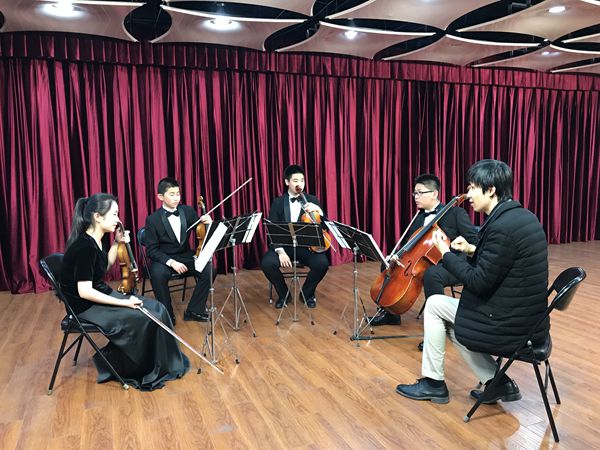 |
|
Cellist Yang Yichen (right) in a music workshop, tutoring several students from the High School Affiliated to Renmin University of China.[Photo provided to China Daily] |
Loyal followers
"It is said that classical music is a high art or high culture but it's not true in China," says Yang. Now 30, he was born in Beijing and started to learn the cello at the ripe old age of 8.
Giving background to the composers and their work helps audiences "enjoy classical music", he says. "That's why we've been trying to do our bit to help usher them into the world of classical music with simple and fun knowledge and anecdotes about the art form and the works."
Yang and the band have a loyal following. Hsieh Peiwen is one of them. She flew from Taipei to Beijing to attend the quartet's concert on June 16.
"The musicians of the quartet use simple language and easy-to-understand stories to explain the history of classical music. This approach made me interested in the composers and their pieces," says Hsieh, who has been following the quartet since 2013.
"The quartet has solid technique and the musicians are dedicated to popularizing classical music among audiences who may have no classical music training or background. It's inspiring," she adds.
The quartet is performing at the National Library Arts Center to Aug 24.
The repertoires include Franz Joseph Haydn's first movement of String Quartet in D Minor, Op 76, No 2, Wolfgang Amadeus Mozart's String Quartet No 19 in C Major, K 465, and Franz Schubert's Death and the Maiden, String Quartet No 14 in D Minor, D 810.
The quartet was founded in 2005 by cellist Yang and violinist Ning, both former students of the Central Conservatory of Music. The other members are viola player Qi Wang and violinist Su Yajing. Violinist Ma Weijia, a co-founder of the quartet, left in 2011 and joined the string quartet at the National Center for the Performing Arts.
In 2013, the quartet scooped three awards at the Asia-Pacific Chamber Music Competition in Melbourne-the Grand Prize, the Dame Elisabeth Murdoch Prize, and the Hamer-Tribe Trust Prize. It was the first Chinese quartet to win a string of three prizes at an international chamber music competition.
Many happy returns
The quartet has toured more than 30 countries and it will perform in September at the Bonn Beethovenfest, a classical music festival in the city of Beethoven's birth.
The idea of combining live concerts with introductions and illustrations about the history of classical music started in 2014, and from the very beginning the quartet received warm feedback from audiences at venues in Beijing, such as the National Center for the Performing Arts, the Forbidden City Concert Hall and Beijing Concert Hall. The players also went to train and interact with students in middle schools during music workshops, including the High School Affiliated to Renmin University of China and Beijing National Day School.
"These concerts are for audiences who want to learn classical music, maybe from scratch. We are musicians and interpreters who want to share our joy of music with them," says Qi, who, like Yang and Ning, teaches at the Central Conservatory of Music.
Compared with the West, the classical music scene in China is relatively young, says Qi. "So fan curiosity and love for classical music needs to be nourished with our help."
Ma noticed that at the concerts given by the Amber Quartet, more people have begun to learn and enjoy chamber music.
"When we started, chamber music was not considered mainstream culture in the country. Parents wanted their children to study music but with the goal of becoming 'great' soloists," says Ma, who returned to the quartet this year.
"But now, to our delight, we find that many children play music together simply because it's fun."